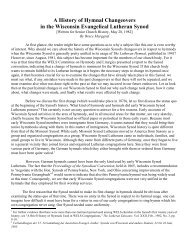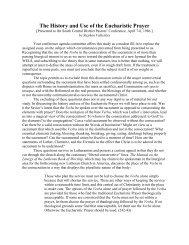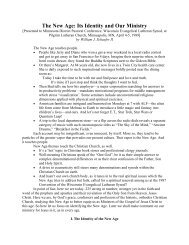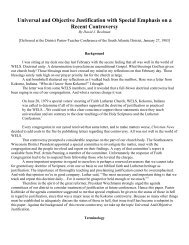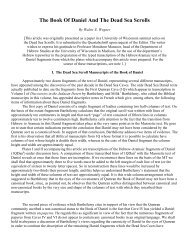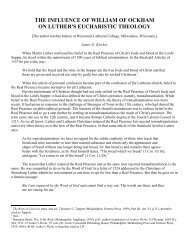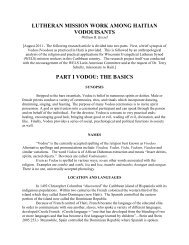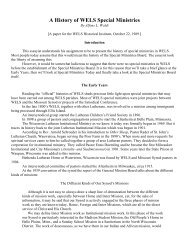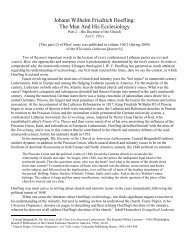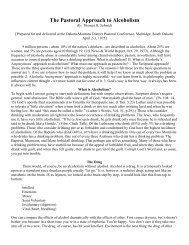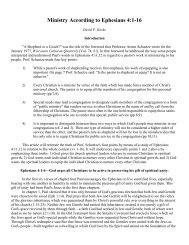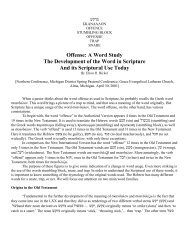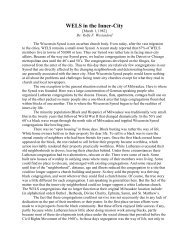Strangers to Sisters - Wisconsin Lutheran Seminary Library: Essays
Strangers to Sisters - Wisconsin Lutheran Seminary Library: Essays
Strangers to Sisters - Wisconsin Lutheran Seminary Library: Essays
Create successful ePaper yourself
Turn your PDF publications into a flip-book with our unique Google optimized e-Paper software.
different forms of church organization the right <strong>to</strong> be called<br />
Ekklesia, if only they use the Word and Sacraments. 262<br />
Lillegard also asserts that there are three points of clear biblical teaching regarding the<br />
local congregation and the synod that all <strong>Lutheran</strong>s must agree upon:<br />
1.) We have the biblical precept and example for the<br />
gathering of Christians in local assemblies, <strong>to</strong> hear the<br />
preaching of the Word, use the Sacraments, exercise<br />
evangelical discipline, etc. But we have no precept or<br />
rules telling us just what form of organization should be<br />
adopted by these assemblies, - the kind of offices and<br />
the number of officers differing greatly the various<br />
places and the various times, according <strong>to</strong> the<br />
circumstances. There is but one rule: “Let all things be<br />
done decently and in order.”<br />
2.) We have biblical precept and example pointing <strong>to</strong> the<br />
need and duty of maintaining fraternal relationship with<br />
other orthodox Christians in other places, both far and<br />
near. We have also both precept and example as <strong>to</strong> the<br />
kind of activities this larger fellowship should<br />
undertake; settling doctrinal disputes, helping brethren<br />
in need, arranging for missionary activity, etc. But we<br />
have no precepts or rules covering the organization of<br />
this larger fellowship, what kind of machinery it is <strong>to</strong><br />
set up, what officers it should have, etc.<br />
3.) Any form of teaching or system of organization that<br />
robs the individual of his rights and privileges as “a<br />
royal priest” whether on the local or wider level, is on<br />
the face of it wrong. “Sovereignty” is an attribute of the<br />
individual Christian; only because he knows no other<br />
master than the Lord himself can sovereignty be<br />
ascribed also <strong>to</strong> the local congregation <strong>to</strong> which he<br />
belongs. 263<br />
Kretzmann would not sit still for this. In a rebuttal <strong>to</strong> Lillegard’s objections,<br />
Kretzmann fired back, basically reiterating his chief points with more fire than before.<br />
But Lillegard again points out that Kretzmann’s arguments are not in keeping with the<br />
clear text of Scripture. First he makes it clear that the English word “church” or<br />
262 George, Lillegard, “Some Objections <strong>to</strong> the Meaning of Ekklesia Considered” Clergy Bulletin 9, no. 6<br />
(February 1950), 51-53.<br />
263 Lillegard, Some Objections, 53.<br />
142



